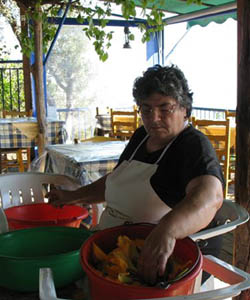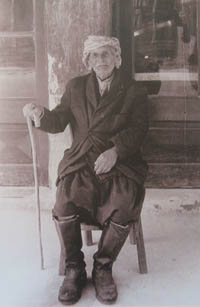Mathematician’s Isle Adds Up
Samos, Greece
by Sarah Shuckburgh
Birthplace of Pythagoras, Samos has all the ingredients of the perfect escape, says
Sarah Shuckburgh
 We are woken by clanging church bells summoning villagers
to mass. It’s another perfect day – sky and sea a startling
blue, the horizon an auspicious blur. The sun is not yet too
hot, so we sit outside for breakfast of creamy Greek yogurt
and honey, cherries and apricots. We are woken by clanging church bells summoning villagers
to mass. It’s another perfect day – sky and sea a startling
blue, the horizon an auspicious blur. The sun is not yet too
hot, so we sit outside for breakfast of creamy Greek yogurt
and honey, cherries and apricots.
My friend Jane and I have deserted our families to spend a
week on Samos in the north-eastern Aegean. Birthplace of
Hera, mythical goddess of nature and fertility, this is a
verdant island of vineyards, olive groves and pine forests.
Our base is the unspoilt fishing village of Ormos, away from
airstrip and crowded resorts.
Each morning, we drive into the hills or along the dramatic,
indented coast, following a charmingly inaccurate map. The
roads are steep and tortuous, and wayside shrines remind
drivers of the perils of precipitous hairpin bends. The
colours dazzle us: beneath an azure sky, deeply fissured
cliffs gleam like nickel, topped with tufts of green; the
orange soil is etched with chalky footpaths and terraced
vineyards. The summer grass, bleached a pale russet, is
strewn with silvery boulders, and smudged with grey-green
olives and dark, slender cypresses. We stop the car by a
gnarled olive tree with a trunk like tangled rope, and gaze
at the barren heights of Mount Kerkis – a towering
silver-grey ridge which brings the island welcome rain. The
verge is fragrant with feathery fennel, bushy thyme,
oregano, mint and rosemary. Below us, a scrubby landscape,
dotted with red-roofed hamlets, stretches to the shimmering
Aegean.
Samos suffered devastating forest fires six years ago, and
today many hillsides are littered with the charred skeletons
of pines. We see planes scooping up seawater to fight a fire
further down the coast, and on parched slopes ancient fire
engines are parked in readiness, with red-shirted firemen
nearby, dozing in the shade.
 We zigzag up to hilltop villages to explore ramshackle mazes
of cobbled alleys, linked by flights of whitewashed stone
steps, and shaded by unexpectedly huge churches. These are
workaday villages, and many houses have been fitted with
ugly plastic doors and windows. Other buildings are
derelict, their lovely wooden shutters dangling from rusty
hinges. At the heart of each village is a shady square with
several tiny tavernas, each with chairs painted a different
colour. Here we while away many hours, sipping sweet, milky
frappés and Samos’s famously delicious spring water. Old men
sit beneath plane trees, twiddling strings of beads. Women
sweep whitewashed doorsteps and sluice the dust into shallow
stone gutters, pausing to greet the priest as he stalks by,
in tall hat and flowing robes. Skinny cats lounge beneath
trailing bougainvillea, suckling even skinnier kittens.
Swallows swoop under the eaves to feed trilling chicks. A
farmer clops past, sitting sideways on his heavily laden
donkey. Overhead, through a tangle of cables, towers Mount
Kerkis’s sunlit summit. We zigzag up to hilltop villages to explore ramshackle mazes
of cobbled alleys, linked by flights of whitewashed stone
steps, and shaded by unexpectedly huge churches. These are
workaday villages, and many houses have been fitted with
ugly plastic doors and windows. Other buildings are
derelict, their lovely wooden shutters dangling from rusty
hinges. At the heart of each village is a shady square with
several tiny tavernas, each with chairs painted a different
colour. Here we while away many hours, sipping sweet, milky
frappés and Samos’s famously delicious spring water. Old men
sit beneath plane trees, twiddling strings of beads. Women
sweep whitewashed doorsteps and sluice the dust into shallow
stone gutters, pausing to greet the priest as he stalks by,
in tall hat and flowing robes. Skinny cats lounge beneath
trailing bougainvillea, suckling even skinnier kittens.
Swallows swoop under the eaves to feed trilling chicks. A
farmer clops past, sitting sideways on his heavily laden
donkey. Overhead, through a tangle of cables, towers Mount
Kerkis’s sunlit summit.
One day, as we wander down a narrow alley, an old lady peeps
from a low doorway. Like many village women, she wears a
black dress and apron, black socks and slippers, and a white
headscarf. Geraniums and dahlias bloom from olive oil cans
on her doorstep.
We bid her good morning – “Kalimera” – and she returns the
greeting, smiling toothlessly.
 My friend Jane spent her teenage summers in Greece, and
remembers some elementary Greek: “orea lathulhia” –
beautiful flowers. The old lady is delighted, and beckons us
into her cluttered scullery. Laundry is heaped in a china
sink. Through a window, I glimpse a darkened room with bed,
table and rag rugs. Our hostess pours orange juice and
explains that she is over 80, with many ailments. Jane’s
Greek proves inadequate, so the old lady hitches up her
skirt to reveal scarred knees, beats her chest and sighs
dramatically. For a moment there is silence apart from the
stream gushing through a stone culvert in the alley. But
suddenly the old lady’s blue eyes sparkle. “You must be
sisters,” she says, as she pours more orange juice. My friend Jane spent her teenage summers in Greece, and
remembers some elementary Greek: “orea lathulhia” –
beautiful flowers. The old lady is delighted, and beckons us
into her cluttered scullery. Laundry is heaped in a china
sink. Through a window, I glimpse a darkened room with bed,
table and rag rugs. Our hostess pours orange juice and
explains that she is over 80, with many ailments. Jane’s
Greek proves inadequate, so the old lady hitches up her
skirt to reveal scarred knees, beats her chest and sighs
dramatically. For a moment there is silence apart from the
stream gushing through a stone culvert in the alley. But
suddenly the old lady’s blue eyes sparkle. “You must be
sisters,” she says, as she pours more orange juice.
I fumble for some coins, but she flaps my hand away. “You
are very welcome. Safe journey - kalo taxidi”.
We drive past isolated farms where chickens peck beneath
peach, plum, fig and lemon trees, and families gather in the
dappled shade of vines. One morning, in a dusty barnyard, we
creak open the door of a tiny chapel to find the damp walls
aglow with peeling frescoes. Later, we stop at a breezy
taverna perched above a deep, wooded gorge. The shrill buzz
of cicadas is punctuated by a cock crowing, and by the
distant putter of a scooter winding up the mountain road.
The elderly proprietress sings as she prepares yellow
courgette flowers, plucking leaves and snapping stems.
Beyond her stretches a mesmerising vista, wild and
beautiful, with tiny whitewashed chapels glimmering against
lush green forest and cloudless sky. Soon two plump men
arrive with armfuls of peppers and spinach. She stops
singing to wave her arms and shout at them, and they argue
back - but soon she is singing again, and her sons sit down
to prepare the vegetables.
“Are you sisters?” they ask us.
We visit a mountain monastery, founded in the 15th century
but now derelict. By chance, the beautiful chapel is being
spruced up for a saint’s day.
 Youths on military service are
whitewashing the porch, dusting icons and polishing the
glittering gold and silver rood screen. At the altar, an
elderly pony-tailed priest is ironing an embroidered cloth,
his cassock tucked into his pockets. Youths on military service are
whitewashing the porch, dusting icons and polishing the
glittering gold and silver rood screen. At the altar, an
elderly pony-tailed priest is ironing an embroidered cloth,
his cassock tucked into his pockets.
There are few tourists in these hills, and tavernas have no
written menus. For lunch, we are offered tomato salad topped
with hunks of feta cheese, stuffed courgette flowers, cheese
pastries, vegetable briam or succulent tomato keftedes - all
smothered in dark olive oil. Local families make oil from
their own black olives, cheese from their own goats, honey
from their own bees, and wine from their own grapes, but few
have thought to sell their produce to visitors. Everywhere,
people offer us gifts – a bunch of mint or a taste of
homemade honey - but will not take any money.
“Are you sisters?” they all inquire.
 Western Samos is dotted with small beaches of pale pebbles
or multi-coloured shingle, lapped by limpid waves. After
lunch, we head for one of these bays and take a siesta under
a bamboo sunshade or beneath a tamarisk tree, occasionally
waking for a bracing dip in the sea. The prevailing winds
and strong currents make this part of the Aegean shockingly
cold. On our first day, our clothes blew into the sea while
we were bathing, and we had to swim out to retrieve them. After that, we carefully anchor our possessions under hefty
stones. Western Samos is dotted with small beaches of pale pebbles
or multi-coloured shingle, lapped by limpid waves. After
lunch, we head for one of these bays and take a siesta under
a bamboo sunshade or beneath a tamarisk tree, occasionally
waking for a bracing dip in the sea. The prevailing winds
and strong currents make this part of the Aegean shockingly
cold. On our first day, our clothes blew into the sea while
we were bathing, and we had to swim out to retrieve them. After that, we carefully anchor our possessions under hefty
stones.
Every afternoon, I try to make sense of the island’s
complicated history, but I never get further than the 6th
century BC - the golden age of Polycrates and Pythagoras.
One minute I am reading about marble paving, tunnels,
harbours, musical intervals and the squared sides of
triangles – and the next minute I am asleep, lulled by warm
breezes and by the rhythmic scrunch of waves on pebbles.

Luckily, Samiots are keen to share their personal histories.
The ticket boy at Tsabou beach shows us a photograph of the
bay in the days before cars, and a sepia print of his
great-grandfather Kostas Tsabos, who purchased the beach
almost a century ago – an impressive moustachioed figure in
turban, baggy trousers, collarless shirt and knee-high
boots, who lived until 1972.
On Ormos beach one morning, we open an unmarked metal door,
and are surprised to find ourselves among the giant
soap-encrusted vats, furnaces and cooling tubes of Samos’s
only olive oil soap factory. The owner, grandson of the
founder, seems delighted to have visitors, and shows us his
heaps of olive mush, hunks of rough, half-finished soap
waiting to be minced and purified, neatly cut grey-green
blocks (large for laundry, small for bathing) and dark,
sludgy residue, sold as fuel. Each bar of soap is stamped by
hand at an upstairs window overlooking the turquoise sea.
“Are you sisters?” the factory owner asks, as he offers us
samples of delicately scented soap.
In the evenings, we eat seafood and drink apricot-coloured Samian wine, made famous by Byron. The sky becomes a
kaleidoscope of reds and pinks, finally turning to indigo as
the inky silhouettes of neighbouring islands disappear into
the dusk. Small fishing boats bob on the darkening waves,
saved from peril by Pythagoras, who, locals believe, keeps a
benevolent eye on them to this day, from the slopes of Mount
Kerkis.
First published by the Telegraph
©SarahShuckburgh |